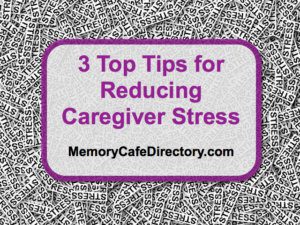Memory Cafe Directory posts and/or links to retailers can be advertising, sponsored, or affiliate links. We may earn a small commission from them. Thank you.
Links to Amazon and other retailers on this page are affiliate links. When you click through and make a purchase, Memory Cafe Directory earns a small commission from the retailer. Thank you.
At the risk of stating the painfully obvious, caregiving is stressful. It is a time-consuming, emotion-consuming, often money-consuming activity.
However, it can be the most rewarding activity we will ever know. Reducing caregiver stress is the best thing you can do for you, and for your loved one.
Memory Cafe Directory is committed to the well being of individuals living with dementia along with their caregivers. Here, the focus is squarely on the caregiver. It is important to share encouragement, resources, and any bits of information that might be helpful to you. At times, it will be long, detailed articles like this. At other times, it will be shorter snippets of information.
We hope it all helps.
Reducing Caregiver Stress
As the New Year continues to unfold, we all hope the stress of the holidays has begun to fade. That’s good, but the holidays seem to add to a caregiver’s stress in an unfair manner.
Preparing for and executing on the holiday activities is a lot of work even for those of us without caregiving responsibility. Add the requisite care element to an already busy time of the year, and the holidays can quickly start to seem unbearable.
Although the current bout of holiday stress is in the past (for now!) it is important to identify, address, reduce, and prevent that stress in the future. Holidays seem to come around the same time each year!

Caregiver Roles
If you care for a loved one, you are what is often described as an “unpaid caregiver” and of course, you already know that. But it might be helpful to know you are not alone.
There are quite a number of different types of caregivers. It’s important to be reminded of the vast array of caregiver types that exist. To gain perspectives on the work professionals do to deliver quality care can help you justifiably feel very proud of the work you do for your loved one.
In addition, seeing the array of other caregiving options and methods available could be very helpful. You may identify certain avenues that could help you with some specific types of support. By doing so, it may help you address a part of the caregiver stress you are experiencing.
Let’s take a look at the overall types of caregivers:
- Non-Certified Aides / Home Helper / Personal Care Aides / Homemakers / Companions
- Certified Nurse’s Aides (CNA) / Home Health Aides (HHA)
- Licensed Practical Nurse (LPN) / Licensed Vocational Nurses (LVN)
- Registered Nurses (RN)
- Physical Therapists (PT) / Occupational Therapists (OT) / Speech Therapists (ST)
- Social Workers (SW) / Medical Social Workers (MSW)
Being reminded of this wide variety of caregiving delivery channels may help you identify options appropriate for you. You can visit CarePathways to read more about each one and hopefully, identify something of value to you.
You’re Not Alone
As indicated above, you are not alone. That doesn’t lessen the load, but it does provide some perspectives that caregiving is unfortunately, a “growth industry.” Many loved ones rely on caregivers around the world and the sobering truth is that the trend is certain to continue and expand.
Before we look at some strategies to help you reduce stress, it would be good to finish painting the caregiving picture. If the types of caregivers is the “breadth” of care, the numbers below should provide the “depth.”
Heres a few recent caregiving statistics:
- 34 million unpaid caregivers provide care in the United States
- 21% of American households are impacted by caregiving responsibilities
- 90% of long-term care is provided by unpaid caregivers
- 35% of caregivers report difficulty finding time for themselves
- 29% of caregivers report difficulty managing emotional and physical stress
- 29% of caregivers report difficulty balancing work and family responsibilities
You get the idea – you are not alone.
Visit the Centers for Disease Control to learn more.
What You Can Do
It is stressful to care for others, regardless of the level of need.
Period.
Whether you are a professional as shown in the above list, or a family member doing herculean work, stress reduction strategies are valuable to all of us.
It is understood the strategies in this article won’t apply to everyone, nor is it an all-encompassing list. However, it is a great place to start. The goal should be to pursue as many of these strategies that are appropriate for your circumstance.
 Mindfulness-Based Dementia Care
Mindfulness-Based Dementia Care
There are of course many ways to address the stress situation in dementia care – or any other type of care, for that matter. This is but one example.
In “Caring for a Loved One with Dementia” Marguerite Manteau-Rao, a Licensed Clinical Social Worker, shares the concepts of reducing stress through a practice called “Mindfulness-based Dementia Care.” She shares how to practice “Mindfulness” and how it can help in reducing stress in your caregiving life.
You can visit the University of Michigan’s Michigan Alzheimer’s Disease Center to learn much more about Mindfulness-based Dementia Care.
3 Keys to Reduce Caregiver Stress
The above example is just one of many effective strategies for dealing the the stress that comes from being a caregiver. Regardless of the approach you use, the ongoing focus in reducing caregiver stress should always be:
1Address
2Control
3Reduce
Keep these three steps in mind and it should help you in the stress reduction process. But you’re probably saying, “That’s fine… but how do I do that?”
Good question. Here’s some ways to look for opportunities to “lighten the load.” Some of these suggestions may pertain to your caregiving situation:
Learn ways to better help your loved one.
Some hospitals offer classes that can teach you how to care for someone with an injury or illness.
Find caregiving resources in your community to help you.
Many communities have adult daycare services or respite services to give primary caregivers a break from their caregiving duties.
Ask for and accept help.
Make a list of ways others can help you. Let helpers choose what they would like to do. Many hands make any task easier.
Join a support group for caregivers.
Find a general caregiver support group or a group with caregivers who care for someone with the same illness or disability as your loved one.
Get organized.
Set a daily routine. Checklists and calendars that are openly visible (and not tucked away in a notebook or a phone) are excellent, persistent reminders of our day’s structure.
Take time for yourself.
Stay in touch with family and friends, and do things you enjoy with your loved ones.
Take care of your health.
Find time to be physically active on most days of the week, choose healthy foods, and get enough sleep.
See your doctor for regular checkups.
Make sure to tell your doctor or nurse you are a caregiver. Also, tell her about any symptoms of depression or sickness you may have. If you need care, you can’t care for others.
Consider taking a break from your job.
Under the federal Family and Medical Leave Act, eligible employees in the United States can take up to 12 work weeks of unpaid leave per year to care for relatives.
Women’sHealth.gov is a wonderful resource to find techniques for reducing caregiver stress. Visit them for more details and to learn more about the resources they offer.
Memory Cafes, Too!
Memory Cafes should of course be part of this discussion. Memory Cafes give you a chance to enjoy an outing together, in a comfortable environment. Although not technically “support groups” they do provide considerable support along with valuable resources and information.
Find a Memory Cafe near you and enjoy a dementia-friendly outing together!
Next Steps
In a perfect world, fingers would be snapped and problems vanish (or at least the solutions would be clearly presented.) However, it is now time for you to take action. (I know, adding another item to your already overflowing plate is not appealing, but will be a good investment.)
Investing some time to learn more about your options now should provide some benefits in the future. This article is a very brief introduction to the support available for managing, and hopefully, reducing caregiving stress in your life.
Additional Reading
Stress Reduction with a Tropical Twist
Here, I take a look at some “mental escape” strategies to help provide a refresh.
5 Effective Ways Caregivers Ask for Help
Many hands made a job easier, but it can also help to reduce stress levels. Learn some effective strategies for getting the help you need.
How to Select a Caregiving Support Consultant
One cause of stress is “the unknown.” One way to address that in your caregiving journey is to get direction from a professional. Allow them to help you learn the ropes.
More Resources on the Way
Come back to Memory Cafe Directory often to see new information and resources to support caregivers. From the growing Memory Joggers library to helpful books and product reviews (not to mention all the Memory Cafes!), anything of value that can provide assistance will be added.
Helping your loved one is a noble and critically-important responsibility.
Supporting you is ours.
Memory Cafe Directory






Comments on this entry are closed.
This is some really good information about how to deal with respite care for someone important to you. Thanks for explaining that it would be smart to look into if they need dementia care. It does seem like that would change up how you get to care for your loved one.
My sister is wanting to become a certified caregiver so that she can help others for a career. I like how you mentioned that it is a good idea to be physically active and make sure you are in a good spot mentally before you help someone. It seems like making sure that you take care of yourself is important so that you are able to help others.